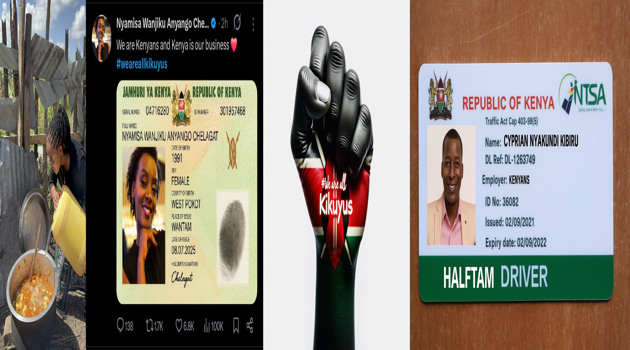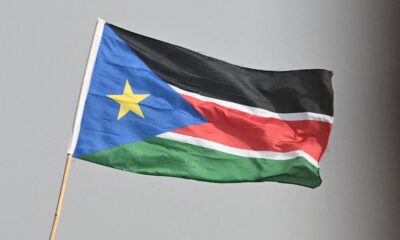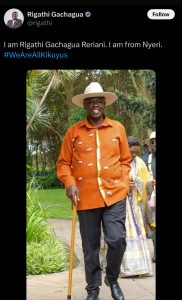Politics
EXPLAINER: Why #WeAreAllKikuyus Hashtag Is Top Trending
The online movement was sparked after politicians allied to the ruling United Democratic Alliance (UDA) accused the Kikuyu community of fuelling the ongoing Gen Z-led protests against President William Ruto’s regime.

NAIROBI, Kenya – July 9 – A powerful show of unity is sweeping across social media in Kenya under the trending hashtag #WeAreAllKikuyus, as thousands of Kenyans on X (formerly Twitter) change their usernames to include Kikuyu names in defiance of tribal profiling linked to recent anti-government protests.
The online movement was sparked after politicians allied to the ruling United Democratic Alliance (UDA) accused the Kikuyu community of fuelling the ongoing Gen Z-led protests against President William Ruto’s regime.
In particular, UDA leaders alleged that the community has been mobilising nationwide demonstrations and inciting other regions against the government—a claim that has angered many Kenyans, especially the protesting youth.
“If this regime thinks the protests are all about Kikuyus, then we are all Kikuyus,” one Gen Z user posted, capturing the sentiment that rapidly turned into a viral trend.
The hashtag is now among the top three trending topics worldwide, with Kenyans expressing solidarity by adopting Kikuyu names and celebrating Kikuyu culture through humorous memes and food-related posts.
Prominent blogger Cyprian Nyakundi changed his handle to Cyprian, Is Nyakundi Kibiru, while former Deputy President Rigathi Gachagua, a Kikuyu himself, tweeted: “I am Rigathi Gachagua Reriani. I am from Nyeri”—tagging the hashtag #WeAreAllKikuyus.
The online uproar follows weeks of countrywide protests, primarily driven by Gen Z youth disillusioned with what they describe as poor governance, broken promises, corruption, and unemployment under the Kenya Kwanza administration.
The tipping point came in June 2024, when protesters staged mass demonstrations against the punitive Finance Bill 2024, which was eventually withdrawn by President Ruto.
During the protests, demonstrators stormed Parliament in an unprecedented show of defiance, leading to the deaths of more than 60 young people.
The movement regained momentum during this year’s Saba Saba commemorations on July 7, 2025, when fresh protests erupted in several towns.
Police sealed off central Nairobi and responded with force, resulting in over 35 deaths, including a 12-year-old girl in Ndumberi, Kiambu, who was killed by a stray bullet while inside her home.
The killings have triggered widespread outrage and condemnation from human rights organisations, including the Kenya National Commission on Human Rights (KNCHR) and UN Human Rights, who have called for accountability.
Despite the public outcry, some UDA leaders have downplayed the protests as ethnically motivated and blamed the Kikuyu community for sponsoring unrest—a narrative that Gen Z protesters have flatly rejected.
“This is not about tribe—it’s about truth,” posted one user. Another wrote: “Tribalism is a thing of the past. That’s why #WeAreAllKikuyus is trending globally.”
In response to the viral hashtag, pro-government accounts attempted to launch a counter-tag, #WeAreAllKenyans, which has so far failed to gain similar traction.
“Government bloggers are not sleeping today as they try to fetch even 5K tweets on their copied boring tag,” Nyakundi quipped in a widely shared post.
As the digital resistance grows louder, the message from Kenya’s Gen Z remains clear: they refuse to be silenced, sidelined, or divided along tribal lines.
In their own words—“Whichever way you look at it, we are not to be rattled.”
Kenya Insights allows guest blogging, if you want to be published on Kenya’s most authoritative and accurate blog, have an expose, news TIPS, story angles, human interest stories, drop us an email on [email protected] or via Telegram
-

 Business2 weeks ago
Business2 weeks ago‘They’re Criminals,’ Popular Radio Presenter Rapcha The Sayantist Accuses Electric Bike Firm Spiro of Fraudulent Practices
-

 Business1 week ago
Business1 week agoIt’s a Carbon Trading Firm: What Kenyans Need to Know About Spiro’s Business Model Amid Damning Allegations of Predatory Lending
-

 Business1 week ago
Business1 week agoManager Flees Safaricom-Linked Sacco As Fears Of Investors Losing Savings Becomes Imminent
-

 News1 week ago
News1 week agoWoman Accused in High Defamation Blames AI As Case Exposes How Mombasa Billionaire Mohamed Jaffer Allegedly Sponsored Smear Campaign Linking Joho’s Family To Drug Trafficking
-

 Investigations2 weeks ago
Investigations2 weeks agoDisgraced Kuscco Boss Arnold Munene Moves To Gag Media After Expose Linking Him To Alleged Sh1.7 Billion Fraud
-

 Africa2 weeks ago
Africa2 weeks agoDisgraced Oil Trader Idris Taha Sneaks Into Juba as Empire Crumbles
-

 Investigations2 weeks ago
Investigations2 weeks agoFraud: How Sh235 Million Donor Cash For Nyamira Residents Was Embezzled Through Equity Bank Under Governor Nyaribo’s Watch
-

 Investigations1 week ago
Investigations1 week agoIntelligence Report Links Budding Politician James Mabele Magio To International Scammers Ring











